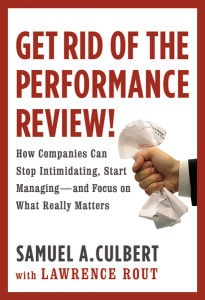Hat tip to the WSJ for their review of the new book Get Rid of the Performance Review!: How Companies Can Stop Intimidating, Start Managing–and Focus on What Really Matters.
Dr. Deming criticized the annual performance review decades ago and it's always nice to see someone else carrying the mantle. Another noted leader sharing this message was Dr. Stephen Covey, who criticized annual reviews as an outdated “industrial age” practice when he spoke at the recent Shingo Prize conference.
 I haven't read it yet, but the author of the book, Samuel A. Culbert, wrote an essay in the WSJ in 2008 titled “Get Rid of the Performance Review!” and I blogged about it here.
I haven't read it yet, but the author of the book, Samuel A. Culbert, wrote an essay in the WSJ in 2008 titled “Get Rid of the Performance Review!” and I blogged about it here.
Yes, there are alternatives to the annual review. As Dr. Deming might have said, we invented that practice (and we invented management) so we can change it. It's not a rule of nature that says you MUST do annual reviews. Nick Sarillo, who I wrote about here and recently visited, doesn't do them.
From the WSJ review:
This corporate sham is one of the most insidious, most damaging, and yet most ubiquitous of corporate activities,” he says early in “Get Rid of the Performance Review!” “How could something so obviously destructive, so universally despised, continue to plague our workplaces?”
I hope Culbert is able to provide evidence, sort of like Daniel Pink did in his book Drive: The Surprising Truth About What Motivates Us. I assume the book consists of more than Culbert giving what might be viewed as opinion that annual review cycles are harmful.
The WSJ review says that Culbert states the annual review is a blame-ridden practice and one that, I might add, is very batchy and non-continuous:
The essence of his argument is simple: In reality your job performance is reviewed every day; there should be no need for an annual review. The trouble, he says, is that too often managers, knowing that they're expected to produce a performance review, withhold feedback when it is most needed—at the moment when an employee makes a wrong step or even does something swell—and instead stores it up for review time. The sense that perceived misdeeds are been compiled for a year-end blamefest is counterproductive and destroys morale.
An insidious cousin of the annual review is the “forced ranking” system where managers are forced to give the demoralizing news along the lines of “I wanted to give you a higher score (and a higher raise), but management only allows X of you to have a certain score.” This kills teamwork and pits employees against each other. That's just one dysfunction of the annual review, as is often practiced.
As the WSJ states, feedback should be a continuous process. This seems to be what Dr. Deming advocated too. This 2006 HBR article (“What's to Be Done About Performance Reviews?“) has a comment from a reader that states:
I too largely agree with Deming: reviews should be continuous and there should be no surprises. If employees are our most valuable asset (and of course they are), reviews should not just be a sporadic or once-a-year thing. It is always amazing to see how some organizations pay so little attention to their employees — far less than they would a less-valuable material asset.
Agreed. So we're getting more and more articles and books attempting to discredit this practice. Who is taking a leadership role to eliminate the annual review and to teach managers about alternatives?
Previous posts of mine on this topic:
- Lessons from a “Like Lean” Millionaire (2010)
- Professor Channels Dr. Deming and Writes “Get Rid of the Annual Review” (2008)
- Are Annual Reviews Killing Your Morale? (2007)
- Performance Appraisal Problems (2006)
What do you think? Please scroll down (or click) to post a comment. Or please share the post with your thoughts on LinkedIn – and follow me or connect with me there.
Did you like this post? Make sure you don't miss a post or podcast — Subscribe to get notified about posts via email daily or weekly.
Check out my latest book, The Mistakes That Make Us: Cultivating a Culture of Learning and Innovation:










Mark,
Great post as usual, and I get it and believe it. My small company’s problem, though, is that we’re distributed all over the place and there isn’t a great mechanism to continuously provide feedback (this is a management consulting firm, btw). I’d love to hear reader comments on this, because we would like nothing better than to make it better!
John D.
Mark,
Let me play the devil’s advocate for a moment regarding forced distributions. Without limits, things tend to get inflated. We see this when internal customers make demands on internal suppliers. External customers, because they have to pay for what they ask for, tend to prioritize what they really want due to the cost of asking for everything. Internal customers, without any restrictions, ask for it all.
With evaluations, when there is no way to budget grades, reviews tend to be inflated. The problem manifests when it is time to allocate out merit based raises or promotions. If a person has been consistently receiving the highest grade but gets average raises, they tend to become dissatisfied. Or if they are told they are outstanding, but get passed over for a promotion repeatedly, they may start looking for work elsewhere.
When I was in the army, there wasn’t a forced distribution, but rather a senior rater profile. You could compare a person’s evaluation to the grader’s history. If the grader was biased toward high evaluations, any high marks they gave out were watered down. In that case, the boss did a disservice to his best performers by grading everyone high.
That said, I like your closing about offering alternatives rather than just discrediting the current practice. I’ll be watching to see what your readers come up with.
Jeff Hajek
.-= Jeff Hajek ´s last blog ..Lean, Poka Yokes, and Taxi Cabs =-.
If you’re playing devil’s advocate, Jeff, I’ll play the Deming card again and say that “merit” raises are a problem.
Like Dr. Covey said in our podcast, that’s probably one of things that leads to “kissing up to the hierarchy” as he put it.
Merit raises put employees in competition with each other instead of focusing on value and the customer. Trying to make a merit raise system more fair by having forced distributions makes a bad situation worse.
The alternative proposed by Dr. Deming, I believe, was team-based pay raises. How can you give individual ratings when everyone works in a system? Nick’s Pizza and Pub does pay raises based on learning and skills acquisition – I wrote about them here:
https://www.leanblog.org/2010/04/lessons-from-a-%E2%80%9Clike-lean%E2%80%9D-millionaire/
I do believe there are practical alternatives to so-called “merit raises”.
Why do merit raises put employees in competition with each other? If they are based on distributions I agree, but I’ve given merit increases to entire groups based on group contribution to increasing customer value. Perhaps it depends on how “merit” is defined.
Another issue on the whole performance review issue is the bloomin’ state of California, which has onerous documentation requirements when dealing with inevitable employee legal issues. However we are finding ways to make a documented performance review still value-added by asking the right questions that promote customer and stakeholder value etc. Trying to move away from quantitative annual reviews to far more frequent qualitative and see if that works.
If there are legal requirements, maybe that’s something Dr. Deming didn’t consider. Maybe it’s less costly to suffer through the occasional settlement payment to someone you had to fire than to suffer through the constant dysfunction of merit pay and performance evaluations?
I think “merit” raises inevitably lead to forced distributions since, as Jeff said, you can’t rate everyone highly. I’ve suffered from that, being told that I had an excellent year, but my rating got bumped down because the bosses “had” to choose somebody for that higher rating.
Jeff says it’s demoralizing to have high performers get a mediocre raise without rankings — there’s one instance where that happens WITH forced distribution.
I think the issue is that you’re defining “merit” as meaning one person’s merit vs another, when I don’t think it needs to be constrained that way. I completely agree with you that individuals need to be considered as individuals, not as part of a distribution. Distributions lead to absurdities like Welch’s GE and I believe Cisco that force-fired the bottom 5% every year. I could define “merit” to be how well an individual contributes to team, company, and customer success. An entire group could be equally meritorious (?) and all receive equal increased compensation. Where is it stipulated that merit means one person has to receive more than another, must receive less if someone else receives more, or that there’s a defined pool of “merit money” that needs to be divvied up? Those are constructs of traditional performance management systems, and I completely agree they are negative.
Let’s set aside the raises for a second and talk about promotions, or any other perks that come with being a high-performer (key account assignments, coveted new projects, etc.). Without an understanding of performance and potential, how would you go about selecting, say, a new supervisor for a team? Isn’t that a merit (and potential) based reward?
And there is always the risk of social loafing on a team. Doesn’t that breed resentment when someone on a team isn’t pulling as much weight and gets a full share of the spoils? While it is possible that everyone on a team performs equally well, it is unlikely. There’s also a different between trimming the bottom 5% of a workforce even if they are meeting the standard, and recognizing that individual performance varies.
I try to be open minded about breaking traditional ideas, but I do struggle with the sense of fairness that if I can do twice the work of the rest of my team, or do it twice as well, that there is no way to reward me for that.
I supect the issue is more one of how the raises are allocated than the fact that they are allocated. I don’t doubt that anyone thinks that Adrian Peterson of the Vikings should get paid more than Adrian Peterson (formerly) of the Bears, despite both doing the same job. In their case, it is pretty clear who the higher performer is. The argument against merit pay raises says that they should both be paid the same, since they work under the same union.
That said, I recall a study that says money is more of a de-motivator than a motivator. In effect, people will be put off if they feel they are paid unfairly, but don’t do more if they think they are paid fairly.
Very interesting topic…
.-= Jeff Hajek ´s last blog ..Lean, Poka Yokes, and Taxi Cabs =-.
At the risk of sounding like the polyanna here, why would people “loaf”? If they’re not pulling their weight or not fitting in with the team, I’d say that’s a leadership challenge not a compensation challenge.
If you contribute twice as much to the team and the others aren’t loafing (maybe you’re more talented) and the team is successful, doesn’t that feel good? Do you need to be paid twice as much? If you’re that good, you probably get (and deserve) a higher base salary, but the problem I have (and others have) is with variable comp bonuses, etc.
More companies are using the higher base comp (pay fairly or more than fairly) and then stop the variable comp annual competition games. Your reward is your base pay and your sense of accomplishment. Intrinsic motivation.
You’re right that being underpaid is demotivating. I’m pretty sure Daniel Pink makes that case in his book “Drive” – that you need good base pay, of course.
I didn’t say everyone should be paid the same. The comparison of the Adrian Petersons is silly. The Vikings player should be paid more, clearly. That doesn’t mean I’d give A.P. an individual incentive that he gets $2M more for breaking 1600 yards in a season. Lots of individual performance incentives in sports and that can lead to problems in a team, can’t it?
Great discussion here, guys.
Here is an opposing view from a compensation blog:
In Defense of the (Insidious) Performance Review. I Think.
http://compforce.typepad.com/compensation_cafe/2010/05/in-defense-of-the-insidious-performance-review-i-think.html
The opposing view is good, but also flawed. I do agree on the documentation side, especially here in California, where having considerable paperwork has saved us ungodly sums of money not to mention court time. Not just with terminated employees taking us to court, but employees that didn’t want to take us to court but are mandated to, state regulators that audit us regardless of whether there’s even a problem, etc. I guess it’s waste, but perhaps unavoidable waste unless you want to confront the state.
However I do take issue with the “Structure” argument that performance feedback will fade away if an disciplined annual process is no longer required. That’s a function of leadership, and how the leadership team itself is evaluated on an ongoing business. If the CEO makes it part of his daily expectations (and feedback) that his staff create ongoing daily feedback with their staffs, expectation and culture can be set. Otherwise yes, performance feedback and discussion will fade away.
Applying the 5 Whys to traditional mindsets can be enlightening. Why do we have the annual numerical rating headache? Why do managers not conduct ongoing regular feedback discussions? And on and on…
Does anyone know offhand if there is evidence that a sales commission system does or does not work? I’d be curious how people see that differently from merit based raises. In both cases, a person is rewarded financially for their personal contributions to a team effort.
As far as the Adrian Peterson comparision, I don’t think it is silly at all. Every time a contract expires, the player has to renegotiate for a slice of the salary cap pie. Think of someone like Chris Johnson who is just finishing up his rookie contract but had over 2000 yards rushing. Should he be awarded a team-average raise? I’m sure if that happened, another team would be more than willing to top it. Granted, individual performance incentives can work against the team when the individual goals are at odds (i.e. two running backs competing for carries), but it wouldn’t be if the incentives were aligned (i.e. yards per carry, or in baseball, batting average).
Bringing it back full circle, though, I am sure Chris’s or the Adrianses’ coaches don’t provide just an end of the season performance evaluation. I am guessing they provide feedback after each series.
.-= Jeff Hajek ´s last blog ..New Lean Terms for the Week (May 28, 2010) =-.
Everyone, I’ve thoroughly enjoyed this debate ‘from the sidelines’…great discussion! Can’t stay on the bench any longer.
WHY should we get rid of performance reviews?…I had to re-read the entire thread to keep proper context in focus. Is the goal to achieve a more positive culture? Build more trust? Retain more employees? All good questions. What’s the goal?
I actually think the football examples apply PERFECTLY. I don’t think the issue is how much to pay a player…it’s more about what the pay should be based on the player’s value to the TEAM.
What makes A.P. from the Vikings so VALUABLE, is that he’s a big threat on every play. This forces the opposing defense to allocate more players to stop him. This makes it easier for the other Viking players to succeed, and also enables the management to fill other roster spots using less money. The question becomes…what’s that value worth?
Again, what’s the goal? If A.P. has a great game, do we win? Do other players decide to leave the team because their role is deemed more valuable by another team?
I LOVE the comparisons to football (huge fan!). What’s our context of winning? Are we playing to win the big game this year, or do we pursue the long-term strategy and field the best ‘value’ team?
I do know these issues become easier when we’re winning. It’s very interesting to consider all the ‘veteran’ players who decide to stay with a team FOR LESS money and WIN, rather than go to a poor team for MORE.
What’s the motivation? What’s the goal? How do we keep on winning? Interesting stuff.
.-= Steve Martin ´s last blog ..Lean Gardening – Celebrate the Weeds =-.
Thanks for your comments and welcome to the blog discussion, Steve.
The goal? Long-term profitability of the oranganization. Achieved through customer focus, high quality, and low cost. Staff morale and engagement leads directly to those goals.
So my argument would be that numerical ranking and annual reviews often harm morale, create internal competition, and harm quality. That’s my position at least.
I think a football team is far simpler than most organizations. As much as I love football, the analogies don’t hold true I think. Again, my argument is not that everyone should be paid the same.
For the record…I’m against annual performance reviews, and we’re on the same team. :-)
I have not read Culbert’s new book either…save for the 1st chapter ‘sneak-peek’. He mentions an alternate to the annual REview, is the performance PREview. Sounds like what we experimented with at Wiremold (Brooks Electronics, Philadelphia)
I totally agree with Culbert’s comment regarding what employees need…they need evaluations they can believe, ones dictated by need, not a date on the calendar.
When the talents and skills of an employee can be directly linked and staged to meet company needs, you begin to build a culture where engagement and career satisfaction can flourish.
That kind of environment gives you a better chance for long-term profitability. Touchdown.
.-= Steve Martin ´s last blog ..Lean Gardening – Celebrate the Weeds =-.
Hey Mark,
I too when working at a previous company, had a performance review and was told by my boss, “I really wanted to rate you at the highest level but then that would mean you have out-grown your job and there is no where to move you internally and we don’t want to lose you, so here you go, this is your level.” Well that was demoralizing, what I heard was, “Well I could be making more because I’m so good but I won’t because this doesn’t make sense!” Thanks so much. My motivation to do well comes from internal drive but hearing that it was recognized and not rewarded was deflating. I wish she never said that to me. I think there is incredible value in real-time feedback. There is resentment that builds when there are issues that aren’t addressed and accolades that aren’t given but held until once a year! Great post.
Here is a blog post sent to me via Twitter, with an alternative approach:
http://www.estherderby.com/2004/11/an-alternative-to-the-yearly-performance-review.html
Here is an NPR interview with Culbert, strong words:
http://www.npr.org/templates/story/story.php?storyId=128362511&sc=nl&cc=es-20100711
I had the pleasure of viewing a closed circuit telecast with Deming in the 90s (his 90s, too, I believe) in which he was asked about his view on pay for performance. He responded (gruff voice, please) “Sure I believe in pay for performance – if you perform, we pay you, if you don’t perform, we don’t pay you!” Meaning, as I took it, have the guts to get people who won’t contribute off the team, and (as he expanded on the point) take care of the rest of the team equitably recognizing that measured individual results are usually meaningless. The quoted phrase stuck with me, anyhow, and I enjoy pulling it out at appropriate moments when people are arguing “pay for performance”.
For some reason people just believe in the system of annual appraisals and merit pay. No amount of reasoning to the contrary will shake them, I’m afraid. The data in most human relations areas are just a little too hard to come by, so people stick with their biases and beliefs.
For years I’ve met weekly with the individuals on my team, with a three point agenda I learned as the acronym WAD: Welfare (how’s it going?), Accountability (accomplishments, challenges, plans, etc.) and Development (what do you need to do to grow? What can I do to support you?). I try to ignore the silly messages that pop up in my email from our online rating system for annual appraisals, and I just keep forging ahead, knowing that we have a high functioning team.
Employee performance review should not be eliminated because of some negative reviews in some company. The one who performs it unfairly is the one who should be ousted in the company.
New commentary by Dr. Culbert in the New York Times:
http://www.nytimes.com/2011/03/02/opinion/02culbert.html?_r=3&adxnnl=1&adxnnlx=1299157247-xRl/CrknebjzLi4Yyh8qBQ
“Why Your Boss Is Wrong About You”
[…] New Book Gives Negative Review to Performance Reviews […]
[…] New Book Gives Negative Review to Performance Reviews […]
I don’t know if this thread is still active, but does anyone know if Ford under Donald E. Petersen actually got rid of their annual performance review as Deming implies in his book, “Out of the Crisis”?
I’m not sure, Colin. If they did, I’m sure it was limited and/or short-lived.